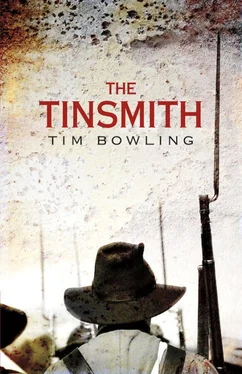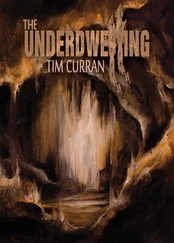Reserve the conversation be damned, Anson thought. And if you’re considering the ladies, you might have noticed that one, at least, is ill and not even listening.
“I’ve been here nearly a week, sir, and in that time any mention of my friend’s name has resulted in a definite air of disapproval. Mr. Lansdowne says that Dare is combative. I think the accusation merits an explanation.”
The Southerner flushed; his smile vanished into a tight line. “Doctor, if you do not have the manners to be composed when a guest at someone’s table, you ought not to accept the hospitality.”
“You’ve only just arrived, and you presume too much.” Anson leaned forward into the candle flickers, staring hard at Thomas Lansdowne. “I believe this gentleman possesses the good grace to answer my question.”
“Dr. Baird,” Henry Lansdowne said calmly, “we know little of your friend. If we knew anything that would be of any use to you, of course we would have shared it.”
Thomas Lansdowne opened his clenched fist and let his fork drop to the table. “You ask why I consider Dare to be combative? Well, you’ve met his crew. Does a peaceful man chase off his Chinamen with a shotgun?”
“What’s this?” Ambrose Richardson said. “A shotgun?”
Anson crossed his arms over his chest. “And are you privy to his reasons? The Chinese said he thought they were spies. Now, would my friend, whom I regard as the most sensible and practical of men, dream up such an idea without foundation?”
Thomas Lansdowne pushed back his chair and stood. The veins in his neck bulged. He leaned hard on the table. “What do you mean by that? Are you suggesting that…”
“Sit down, Thomas,” Henry Lansdowne said. “The doctor’s not suggesting anything. He is, quite rightly, concerned for his friend. Dr. Baird, I am certain Dare will return soon. When he does, you can no doubt gather his impressions of the delta.”
But this effort to defuse the tension failed miserably. Ambrose Richardson had stood as well, his back very straight, his pinned sleeve completely still. “I would apologize, ladies, for the behaviour of my countryman, if indeed we shared the same country.”
Ah, yes, Anson frowned, it was only a matter of time. He steeled himself for the fight, but a small gasp from across the table stopped him from responding.
“Edney, dear, what is it?” Mary Lansdowne reached a hand out to her sister-in-law, who was staring wide-eyed at the black window. Her mouth hung open, the fingers of one hand were splayed at her throat.
Then, from outside, came the rapid, violent barking of a dog.
“Here, Edney,” Mary Lansdowne urged, “drink some water. Oh, Father, perhaps a little Madeira. To settle her nerves.”
“I’ll see to the dog,” Thomas Lansdowne said and charged around the table, out of the room.
“Excuse us, gentlemen,” Henry Lansdowne said, rising. “I must speak with my brother. Mary, take Edney to lie down.”
“If there’s anything I can do,” Ambrose Richardson said, addressing Mary Lansdowne.
Anson rose and went to the stricken woman’s side, feeling guilty that he had not acted sooner upon his observance of her nervous condition. She was pale, her pulse very rapid.
“May,” she whispered. “Outside. Mary, I’m certain of it. It was she.”
“Hush now, hush. Let the doctor tend to you.”
On his knees beside her chair, Anson gently let her wrist down into her lap. “A small glass of spirits is sensible. See if you can get her to take a few sips before she lies down.”
Edney Lansdowne gazed at the air. “May. Oh, child, what is it? What can I do?”
Distressed, Mary Lansdowne hurriedly helped her sister-in-law to her feet and gently led her away.
Two candles had gone out, dimming the room. The keening of the wind increased until it seemed to surround the house. But the barking, at least, had stopped. Anson returned to his chair at the table, thinking, of course, she’s suffered the loss of a daughter who was almost a young woman, that explains it. And now, in her condition, she doubtless fears another loss, the two events becoming one in her mind; it’s not uncommon, and, yet, it seems close to unbalancing her reason. I must speak with the husband.
Ambrose Richardson’s continued presence took Anson by surprise, more so than his contentious manner.
“I would not think,” he said, all pretence of manners dropped like a gauntlet, “that you’d have the gall to speak of interfering in other people’s affairs, as if it were something that offended you. Your country’s interference in my country’s affairs cost me a great deal more than my arm. You’re fortunate that my losses have not deprived me of my adherence to the proprieties of civilized life. But I warn you, sir…” He pulled his shoulders back and glared down at Anson. “I’m no more apt to forget an insult to myself than I am to forget an insult to my country.”
Anson rarely had any taste for such argument. The past, as it had often done, exhausted him. He had spent the better part of twenty years trying to escape the honest, killing errors he and his medical colleagues had perpetrated in the name of healing. All those surgeries performed in filth, all those wounded men lying in stables and barnyards and manured fields, all those instruments cleaned in bloody water. It didn’t help to know that they’d done so much damage in innocence, just as it certainly didn’t help to know that victory had not put an end to the hatred between the two combatants. And Anson knew that he’d come to the aid of Dare for the sake of washing away the ugliest memories of that past; his friend was still the cure for futility and despair, just as he had been at Antietam. There might not be a god or a country worth all that suffering, but there remained the idea of a certain kind of man, an idea Anson continued to put his faith in. If he did not, then there was no reason at all to respond to the hatred directed at him now.
He stood and, unblinking, faced the self-righteous Southerner. “When you threaten a man or his country, you must expect the consequences. I won’t hesitate to defend myself.”
“Defend?” Richardson’s jaw trembled. “Is that what you call the war, a defence?”
“Yes. A defence of principles.”
Richardson’s cheeks flushed. His jaw and eyes went rigid. “I suppose you’re referring to the negroes. And do you suppose, doctor, that you’ve done that race a great service? You think they’re happier now, working for the great munificence of your wages?”
“I would imagine they are, yes. Better to do an honest day’s work for yourself than to do a lifetime’s work for someone else.”
Richardson smiled unpleasantly, revealing a yellow cast to his teeth. “That’s the trouble with your country, doctor. You make no distinction between work and money. It never occurs to you, does it, that a man might work for something greater than that?”
“If money means freedom, then it must be great indeed to those who are only allowed to earn it for others.”
“Have you lived among them? Do you understand the first thing about what they value?”
Suddenly Anson saw a young, white-skinned man staggering across an open stretch of torn earth, his eyes swimming with terror. Money was beside the point. That young man had almost driven himself mad to earn his freedom. Anson had no more time for the Southerner’s platitudes about slavery than he had for the Christian’s blind belief in a merciful God. Dare existed outside of both positions. He assumed only one: that a man of character and courage deserved to be the master of his own life.
But before Anson could articulate the thought to Richardson, the Lansdownes returned.
“Our sincere apologies, gentlemen,” the elder said. “We wished only to make a check of the property. The Orientals, and the Indians of the area, are generally to be trusted, but, of course, we can’t take their movements for granted.”
Читать дальше












